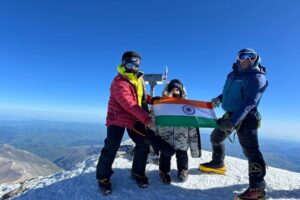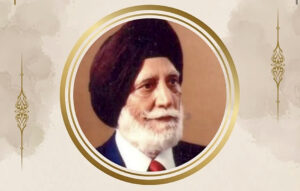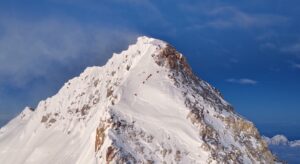How did COVID get to Everest Base Camp? Should the season be canceled? A doctor weighs in.
The voluntary medical team of the Himalayan Rescue Association first revealed the possible cases of COVID at Everest Base Camp on April 23. But after that initial report, they have mostly remained silent.

The voluntary doctors at Everest treat many ailments, including COVID.
However, one of the physicians with the International Society of Mountain Medicine (ISMM) at Everest Base Camp recently admitted that “many people” have been evacuated from EBC with suspected COVID, and later tested positive in Kathmandu.
The doctor went on: “We have protocols in place at the Himalayan Rescue Association’s EBC clinic for treating patients with suspected COVID,” he said. “We have been denied permission by the Ministry of Health to do PCR testing. Khumbu Cough and other respiratory ailments can look like COVID, so we basically treat all cases as if they were COVID…Many climbers are isolated in their tents at the moment. Expeditions are also isolating themselves, minimizing interactions with other expeditions. In Kathmandu, hospitals are not yet at full capacity, but ICUs are filling up quickly.
“The Government seems determined not to close down the climbing season, but this could change any time. I agree with my colleagues that, for those who are not already here, now would not be a good time to come to Nepal.”
To understand how the situation in Base Camp may have developed, ExplorersWeb sought out Dr. Iñigo Soteras, the medical head of Spain’s Mountaineering Federation and a professor of Wilderness Medicine. Dr. Soteras is not currently at Everest Base Camp but he is in touch with colleagues who are. He has also collaborated with the HRA for years and knows EBC well.
ExplorersWeb: How is it that COVID cases were not identified until tests in Kathmandu?
Our standard protocols in high-altitude environments dictate that unless proven otherwise, all problems coherent with AMS [Acute Mountain Sickness], are primarily diagnosed as AMS and evacuated for further examination. Now, in the current pandemic situation and after the first cases of COVID were confirmed, the analysis has changed. Most AMS symptoms, such as tiredness, shortness of breath, headaches, and intestinal problems are also typical of COVID.
COVID at altitude
Many climbers hurried to leave for Camp 2 and some plan to extend their stay there. Could they carry the disease up to 6,400m?
Well, I doubt anyone not feeling well would go up to Camp 2. Even if they suspect that they are having acclimatization problems, climbers know that they should definitely go down and not up. It would be a different story if the symptoms presented themselves once the climber is in Camp 2. Then he/she might get a wrong perception and take his ill-being as acclimatization problems rather than COVID. But again, they would need evacuation. That’s more complex in Camp 2 than in Base Camp.
Does COVID hit harder at altitude?
Yes, high altitude will exacerbate the symptoms because the virus is attacking already weakened bodies, under conditions of dehydration, less O2 saturation, tiredness, and possibly weakened immune systems. It’s similar to someone with previous ailments getting COVID: The risk of developing serious symptoms is higher.

Dr. Iñigo Soteras, a specialist in mountain medicine.
Supposedly, open air is the safest environment. So how did they catch it? Is EBC a safe place or not?
That depends on what you compare it to. A Base Camp is somewhat safer than other accommodations, thanks to the time in the open air and individual isolation when in personal tents. But a crowded base camp is dangerous compared to a BC with only one expedition at the foot of a lonely peak. So, in that sense, Everest’s is the worst of all BCs. Even in the mountains, there is no such thing as zero risk. Collective tents are usually badly ventilated because of the cold, and social distance is not respected at all. I am sure that the doctors at the HRA’s clinic were not surprised when the first cases appeared.
In your medical opinion, is it wise to continue with the expeditions?
It’s a difficult call but as a doctor, I have to say that the risk is too high. Despite helicopters, technology, and communications, Everest Base Camp is still a remote, isolated place. If I were leading a team, I would only have gone if I had very clear criteria of self-sufficiency and no contact with other people. Otherwise, it is really difficult to control everyone, everywhere and all the time — not only the foreign climbers but also the local Base Camp staff, possible visitors, workers, and suppliers serving several expeditions, etc. Even if I were leading a trekking group, I would not continue the trip: contacts in lodges, with local people and other trekkers, etc. The risk of infection or infecting others is far too high, in my opinion. Besides, the situation in Nepal is really concerning, and hospitals are going to be full very soon.

Nepal’s government, outfitters, and many climbers intend to keep Everest open. But for how long will they succeed? Photo: Everest ER
Nepal running out of hospital beds
According to The Kathmandu Post, the shortage of hospital care has already arrived. Nepal’s Minister of Health said today that “as the number of infections has been increasing, the health system is not able to cope. A situation has already arisen in which hospital beds cannot be made available.”
Yesterday, Nepal registered over 5,000 new cases, bringing the number of active cases to almost 40,000. This is a huge number in a country with limited medical resources, and with neighboring India fighting a devastating wave that has no signs of slowing down.
Everest Base Camp, a canvas village of over 1,000 people, earlier this week. Video: Sandro Gromen-Hayes





